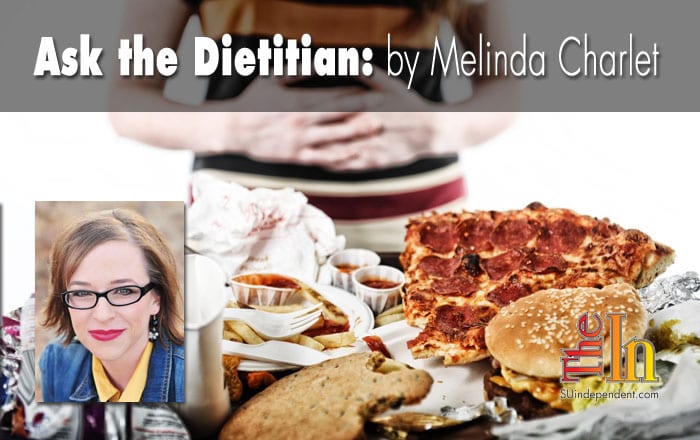
Written by Melinda Charlet
Dear Dietitian,
I’ve always subscribed to the idea of a cheat day. If I eat well all week, I get to cheat and eat or drink whatever I want on the weekends. Lately, I’ve been wondering if my splurging on the weekend is undoing all the good I’ve done during the week. It seems to halt my weight loss, and if the foods I don’t eat during the week are bad for my body, why would it be ok to eat them on the weekends? It’s fun and they taste good, but I always feel bad afterward. Is this a good system or not?
Feeling Conflicted
Dear Reader,
Many diet plans promote cheat days or cheat meals as having important benefits, such as boosting your metabolism, improving diet success rates, and preventing feeling deprived. However, I think you are onto the reasons why this may not be the best tactic.
If you are cutting back on calories or carbohydrates during the week, occasional meals or days that have higher amounts of healthy carbs are fine and may actually have a benefit. But bingeing on harmful foods—such as sugar, trans-fats, and refined wheat—doesn’t make much sense. Here are a few reasons why cheat meals or cheat days may not be good for you.
“Cheating” is a negative word
The problem with “cheat days” starts with the wording. The word “cheat” indicates that what we are doing is forbidden or bad and is associated with feelings of guilt or shame. If we put certain foods in the “bad” category, we are likely to crave them even more, and when we have the opportunity to eat them, we are more likely to overeat. Instead of having a designated “cheat” day, just eat an overall healthy diet most of the time. Maybe following a 90-10 rule would be a better way to go. Follow a healthy diet 90% of the time, and leave the other 10% for indulgences.
Restricting leads to bingeing
Restricting ourselves all week and then going no-holds-barred on cheat day can have unintended consequences. Because we are only allowing ourselves to splurge for one meal or day, we try to cram as much in as we can in the designated time. It is possible to undo all of the good work you’ve done all week in just one sitting. Also, the massive blood sugar and insulin spike that results from our feast can lead to cravings for several days afterwards. By eating a balance of healthy foods most of the time, with none of them labeled as “bad,” you can reduce the cravings that will lead to bingeing.
Bad side effects
You will probably also feel miserable after your cheat day. When your body gets used to eating healthy, your whole digestive system changes to be more efficient. Your taste buds also change, and real foods actually taste better. Once your body gets used to this new way of processing things, it doesn’t know how to handle junk food. You may have digestive issues or feel bloated or tired. Your cheat foods may taste good while you are eating them, but the side effects are usually not worth it.
Feeding the addiction
Junk foods can be addictive. People who have issues with overeating should stay away from their trigger foods, just as an alcoholic should avoid alcohol. If you continually partake of something that you are addicted to, it just fuels the addiction. If you are truly addicted to something, the best thing is to completely avoid it.
In some instances, you may decide to avoid a food because you don’t feel like it’s healthy for you, but in other cases, it may be even more critical to abstain from certain foods. Diabetics should avoid sugar for obvious health reasons. People with food allergies could potentially die from eating an offending food. Food intolerances, such as gluten or lactose intolerance, might not be life threatening, but eating foods you have intolerances to can have negative effects on your digestive system and can make you feel very sick.
What to do instead of cheating
Decide what foods you want to exclude from your diet, and also decide which foods you want to include but in limited amounts. Then, instead of saving these all for one day or one meal, spread them out at various times throughout the week. This will help you practice more mindful eating by staying in tune with your “hunger vs. fullness” cues. You will find more pleasure in mealtimes and not have the bad side effects of overeating on one day. This will also get rid of the feelings of deprivation, anxiety, and shame. This way of eating is more sustainable over the long term and will make life more enjoyable.
Healthy wishes,
Melinda the dietitian
Feel free to submit your nutrition related questions, and I will address them in future editions of “Ask the Dietitian.”
Melinda Charlet is a Registered and Licensed Dietitian that lives in St. George, Utah. She has a bachelor’s degree in Medical Dietetics and works throughout Southern Utah and Nevadahelping patients and clients achieve proper nutrition for their individual needs. She likes to create healthier versions of recipes in her free time. She assists people with a variety of conditions including diabetes and kidney disease, and counsels people that would like to lose some weight, need help dealing with cholesterol issues or simply want to live a healthier lifestyle. Send her your questions to [email protected] or connect with her on Facebook @ https://www.facebook.com/MelindaCharletRD.



